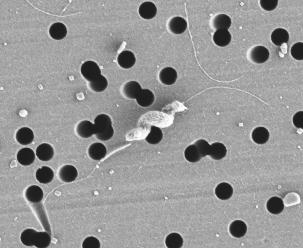Selenium deficiency stops Campylobacter gut colonisation

Scientists at the Institute of Food Research, Norwich, UK, have isolated the two genes that promote the formation of formate dehydorgenase, an enzyme that helps Campyolbacter bacteria colonise the gut.
The Campylobacter bacteria has two genes that program the formation of the formate dehydrogenase enzyme, and Dr Arnoud van Vliet and his group have found at the Insititute of Food research that deactivation of the genes prevents the bacteria’s ability to make formate dehydorgenase, an enzyme Campylobacter needs to respire: without it Campylobacter’s dispersal in the gut is restricted.
Campylobacter needs selenium to make formate dehydrogenase, and gene deactivation shut down the process. After deactivation of the genes the researchers supplemented the bacteria with extra selenium. The result was that Campylobacter could resume making the enzyme, underscoring the crucial importance of selenium to the bacteria.
Knowing the selenium dependency may open new avenues to developing anti-microbials to stop Campylobacter is poultry intestines and better poultry health, and there-by preventing the bacteria reaching the human consumer.
Food poisoning by Campylobacter is responsible for 500,000 cases reported in the UK alone.
- Source: Institute for Food Research IFR, go to the site for a link to the journal article.













